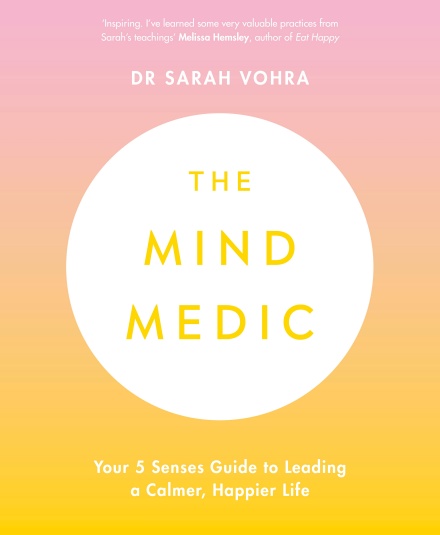Feeling stressed or anxious? Leading Consultant Psychiatrist, Dr Sarah Vohra reveals how we can use our 5 senses to improve our mental wellbeing – from her new book The Mind Medic
Feeling out of sorts but can’t quite put your finger on why?
We experience the world through our senses: sight, hearing, smell, sense of touch (feel) and taste.

So it makes sense that when we feel on edge or down, we can use these senses to ask ourselves if there is anything we may have seen, heard, smelled, felt or tasted, that could possibly provide an explanation as to the mood we find ourselves in.
It may be that you have seen something negative on social media (see), or spent the afternoon with an overly critical boss (hear).
Maybe you overlooked your usual daily breath work (smell) or woke up feeling less than perfect (feel).
Perhaps it is only mid-morning but you’re on to your second double espresso to get you through a particularly busy work shift (taste).
Think about what sort of mood you were in yesterday, and ask yourself: what have your senses come in to contact with that could explain why you feel the way you do?
There may be times when you struggle to put your finger on what it is about a particular day or interaction that means your mood takes a turn for the worse.
what have your senses come in to contact with that could explain why you feel the way you do?
I teach my patients to think about their 5 senses so they can slowly piece together the jigsaw of the day and identify possible stresses.
When you anticipate a heatwave, you plan ahead – sun cream, sun glasses, water bottle. You equip yourself with the tools you need to feel comfortable with the change in temperature.
While you may not be able to avoid temperature change at work (aka stress is inevitable), you can adapt how you respond to this change or stress.
The 5 sense toolkit – empowering you to create ways to feel calmer and happier
Depending on what stresses come up for you, the 5 Senses Plan is a simple method to help you pinpoint your life stresses, develop simple solutions to manage them and reclaim your inner calm.
From too much screen use to feeling under constant pressure, we need to address our senses if we want to live a happier and calmer life.
Be sure to check in with how these changes have made you feel at the end of each day, week and month of consistently putting them into practice.
Here are some suggestions on things that might help:
Sense #1 See
This may include:
- Spending too much time on your screen – do you need to set a limit on your screen use?
- Scrolling highlight reels on social media – should you curate your social media feed and unfollow what upsets you?
- Seeing an ex partner – say no to meet ups or FaceTime with certain individuals and choose a positive family member or friend instead?
What can help? Choosing to read a book or curl up with a good box set.

It’s safe to say that screens are here to stay, so we need to learn how to foster healthier relationships with them and limit the amount of time we spend staring at them.
Screen use can blur the boundaries between work and rest when actioning that late night urgent email or finding yourself down a social media rabbit-hole of comparison. These behaviours stand to negatively impact your mood, confidence, anxiety levels and sleep quality.
Indeed, several studies have shown that increased levels of screen time (seven hours or more per day) are associated with an increased risk of depression.
Over screen use has also been shown to impact attention levels, with evidence suggesting that combined high use of computers (more than four hours per day) and phones is associated with prolonged stress and depression, particularly in women.
For me personally, I know that whilst I rely on my phone for work, I am aware that my phone plays a key role in my stress and anxiety – being drawn into online social comparisons and even getting in the way of a good night’s sleep.
I make sure the first hour of my day is completely phone-free
Indeed, blue light (LED) that is emitted from smartphones and other screens can impact out natural sleep rhythm, reducing the quality of our sleep, impacting our mood, concentration and energy levels the following day.
This is because LED light blocks the release of a hormone called melatonin which is crucial in triggering the pathways for onset of sleep.
It is far from realistic to introduce a blanket ban on our devices, but we can set sensible limits and opt for optimal doses of screen time.
In order to ensure I am not willing away the hours on my phone, I make sure the first hour of my day is completely phone-free.
This allows me to set my own morning pace and mood without it being affected by that ‘urgent email’ that’s come in overnight or someone else’s picture perfect highlights reel that fuels comparisons from the moment I get up.
Once I’m showered, dressed, spent time with my family, done everything I need to do to feel like me and better prepared to tackle the day, I then invite the rest of the world in.

Sense #2 Hear
This may include:
- Your inner monologue telling you that you’re not good enough – do you need to practice regular positive self-talk?
- Struggling to listen to your internal no – should you be exercising your inner no so you’re not feeling overwhelmed?
- Criticism from a boss or partner
What can help? Try calling a friend or listen to an inspiring podcast or audiobook.
Take yourself back to your last high-pressure situation – a job interview, a driving test or first date. What was your first thought when you entered that situation?
For many of us, our inner critic makes us think something like: ‘You won’t get the job’ or ‘They aren’t going to fancy you’. Did you have butterflies in your stomach? Did you feel nauseous? Perhaps this made you act differently and you were awkward or nervous.
All too often we can find ourselves caught up in the vicious cycle of think, feel, act. But by learning to rationalise and manage our thoughts we can change how we talk to ourselves and silence our inner critic.
Sense #3 Smell
This may include:
- Not managing to go outside and smell the fresh air – do you need to set regular time aside to go outside?
- Are you getting pulled into people’s ideals on social media
- Not taken any time out to practice self-care
What can help? Have some time out to run yourself a nice bath, light a candle or practice mindfulness or meditation.
Early studies suggest that mindfulness and meditation may be helpful in reducing stress, alleviating mood and anxiety, as well as improving quality of life in healthy adults.

Sense #4 Feel
This may include:
- Feeling worried and under pressure constantly – is there anyone you can call upon to lighten the pressure you put yourself under?
- You could have taken too much on – can you delegate tasks so you are not taking on too much?
- Feeling less confident adjusting to a new way of life
Have you ever experienced ‘imposter syndrome’? Imposter syndrome is a phrase used for moments where you doubt yourself and your abilities, leading you to fear that you’re going to be found out, uncovered as a fraud for not knowing as much as you claim to or being as experienced as you claim to be.
Imposter syndrome is a phrase used for moments where you doubt yourself and your abilities
People can feel this way despite knowing that they have a wealth of skills, qualifications and achievements under their belt – which can be incredibly disabling and leave you feeling on edge.
You then start to play your successes down, believing that they are from sheer luck rather than addressing all of your hard work.
If you are feeling worried, Dr Vohra has a helpful tool ‘The Worry Dump’ over on her Instagram Page and within the book which looks at how we can park our worries and stop them from snowballing out of control.

Sense #5 Taste
This may include:
- A recent change in diet
- Are you eating more than usual?
- Consuming more stimulants like caffeine or energy drinks – think about cutting down your caffeine and alcohol consumption which may be ramping up any negative feelings you may be experiencing.
- Perhaps you have not been eating enough – take the time to plan out your meals and snacks for the day.
I often see patients who have struggled with their relationship with food for various reasons, from those whose increase or decrease in appetite may be down to their depression to those who have developed disordered relationships with food, which in turn impacts their emotional health.
Eating regular balanced meals will help with fluctuations in blood sugar
There is no question that the relationship between what we eat and our mental wellbeing is a complex one.
Have you ever forgone a meal or snack when you know you ought to have eaten something. You may have experienced negative effects from this such as headaches, irritability, feeling light-headed and struggling to concentrate.
Try your best to take the time to plan your meals to avoid this. Eating regular balanced meals will help with fluctuations in blood sugar and is also necessary for optimal hormone response.

Dr Sarah Vohra is a Consultant Psychiatrist with over ten years experience working with the NHS.
Dr Vohra is Author of The Mind Medic available to buy on Amazon in the US and in the UK.

She is passionate about debunking myths around mental health and sharing her expert tips and tools to help us all lead calmer, happier lives.
Instagram: @themindmedic
Relevant Healthista Content:
Got stress? These 3 mindsets are fuelling your anxiety
Is mindfulness the key to better sex?
From depression to body image – 7 mindfulness meditation videos for mental health
How to stay calm at work – what this war crimes barrister wants you to know
Healthista Content you may also like:
3 best tasting CBD supplements
Journalling – why is everyone doing it? Psychotherapist reveals 5 benefits
